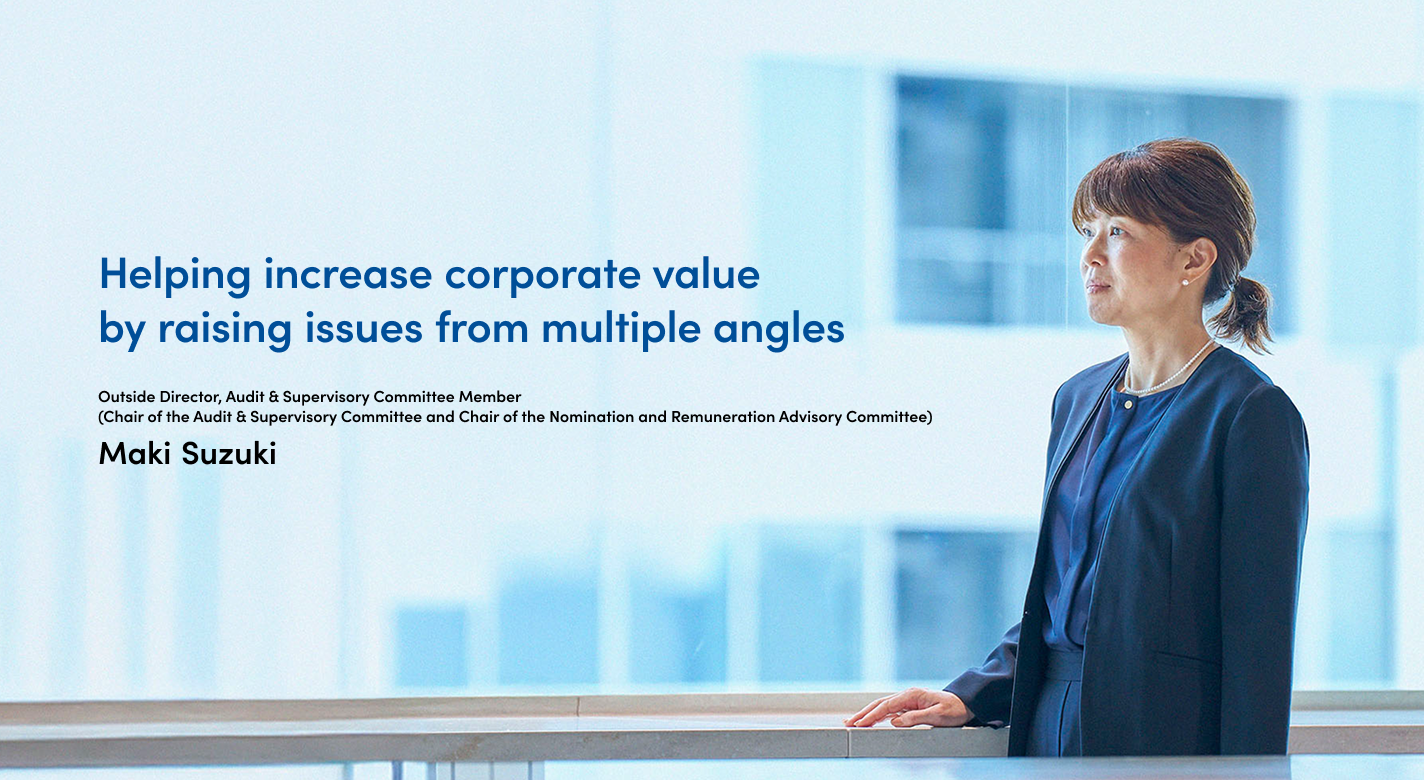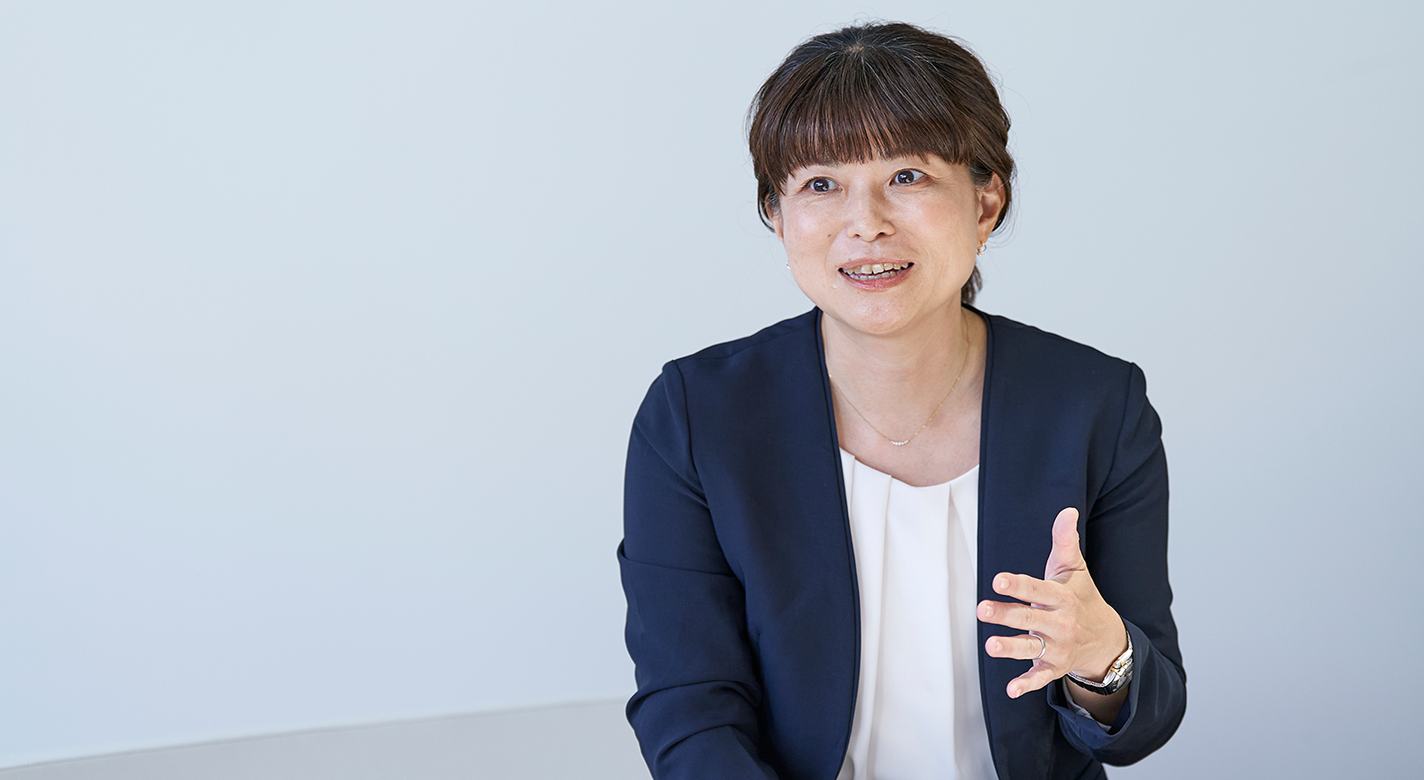
Board of Directors' Culture of Openness

It's been three years since I joined as an Outside Director and Audit & Supervisory Committee member. In that time, as a supervisor, I see it as commendable that the Board of Directors and the internal directors have consistently demonstrated an attitude of sincerely accepting the opinions of Outside Directors and fulfilling their accountability. For Q&A sessions, necessary materials are prepared and detailed explanations are provided. CEO Terada also proactively reports information he deems necessary, enabling transparent discussion. These are not mere responses—they form the foundation of the Company's Board of Directors' culture of openness.
The major change over the past year was the shift in the ratio of internal to outside directors from 5:4 to 5:5. Internal directors prepare for Board of Directors meetings more thoroughly with the expectation that Outside Directors will ask tougher questions as they speak up more. Sound oversight resultantly functions through constructive and rigorous discussion. In particular, Tsunehiro Shirota, newly appointed to the role, has contributed to invigorating discussions through concrete proposals and incisive comments on business matters, grounded in his investment and management experience. In August 2025, Shigemiki Komori joined as an Outside Director. His extensive experience at global IT companies and expertise in software and data fields further strengthened the Board's skill balance.
As a company with an Audit & Supervisory Committee, Sansan has three Committee members among five Outside Directors. Committee members frequently provide oversight and conduct audits with a focus on risk, whereas Outside Directors who are not Committee members provide expertise-based advice from the perspective of business advancement. These two roles complement each other, enabling the Board's oversight function to be exercised more effectively from defensive and offensive perspectives.
Review of Board of Directors Discussions Over the Past Year

Looking back over the past year, one of the most important agenda items was the sale of shares in Unipos Inc. Under the circumstances in which the capital and business alliance failed to yield the anticipated results, we discussed the sale at Board meetings from the stage at which negotiations with potential buyers were likely to progress. We carefully deliberated, starting with a question raised by Outside Directors: "Should we sell even if we record extraordinary losses?" We systematically examined the scenarios for the case in which we didn't sell the shares, and the risk scenarios for the case in which we continued holding the shares. The discussions spanned three to four months, extending beyond the scope of deliberations of the agenda item at Board meetings, with the CFO providing thorough explanations to the Audit & Supervisory Committee members. Through these processes, the Outside Directors also confirmed the appropriateness of the sale policy and approved it.
This case served as an opportunity to verify the appropriateness of the investment decision, rather than the its financial impact. We, the Audit & Supervisory Committee members, have been discussing how to review and improve the Company's investment policies and practices. The goal is to establish more effective standards, not to suppress investment. We will proactively update our investment strategy while monitoring the overall situation of portfolio companies through semi-annual reports, keeping in mind proposals to clarify exit timing and criteria.
Over the past year, we also have devoted considerable time to Bill One's growth strategy and productivity improvements. The executive team presented projections for such improvements through improving the effectiveness of sales personnel. The Outside Directors, however, raised the issue that consideration should be given not only to strengthening sales abilities but also to potential improvements in sales methods and the solutions themselves.
Activities Outside the Board of Directors Meetings

The Company holds 30-40 minute open discussions after each Board meeting to strengthen Board effectiveness and support Director training. In FY2023, we discussed forward-looking themes, such as a market capitalization of 1 trillion yen. For FY2024, we analyzed key business metrics such as net revenue retention (NRR) and the Magic Number (a metric measuring the relationship between customer acquisition cost and revenue). We then discussed how these metrics can be used to drive business growth if they are adopted as internally prioritized KPIs. This discussion on KPIs also led to questions about what aspects were lacking when assessing the current state of the Board using certain metrics. It was also beneficial for improving the effectiveness of the oversight function that Outside Directors perform. Director Shirota introduced examples of American fintech companies, providing an opportunity to learn points that the Company should adopt. Going forward, we intend to establish a forum for discussing investment decisions before Board deliberations.
We also continued the practice of Outside Directors conducting interviews with Executive Officers, which began in FY2023. This time, not only I but all the three Audit & Supervisory Committee members participated and asked questions based on our respective areas of expertise. This practice further invigorated the interviews, and we were able to identify specific issues in the field. Our understanding of the business deepened, and we could identify both gaps and common ground between the perspectives of the field and the Board. This led to identifying areas for improvement beyond limited to sales in the productivity discussions on Bill One. Incorporating the field perspective into that of Outside Directors made discussions at Board meetings more multifaceted, making governance more effective. Directly exchanging views with the next generation of leaders will also be valuable for future discussions within the Nomination and Remuneration Advisory Committee.

Audit & Supervisory Committee and Nomination and Remuneration Advisory Committee

As Chair of the Audit & Supervisory Committee, I consider it my responsibility to lead the Committee in a way that enables each member to fully leverage their expertise in overseeing the legality and appropriateness of the Company's activities. To that end, we are continually mindful of sharing the appropriate information among all three Committee members. For example, when a change was made in the management structure over the previous year, the Committee raised concerns that the standards the Company requires of management may not be clear enough. This point was also confirmed during an annual meeting between CEO Terada and the Audit & Supervisory Committee, in which we directly exchanged views on the need to codify standards and review development systems.
The Nomination and Remuneration Advisory Committee has four members: one internal director, CHRO Ohma, and three Outside Directors, including myself, effective from FY2024. From FY2025, the Committee is consist solely of Outside Directors, which will further reinforce objectivity and independence. Though the Committee has not been in place very long, over the past year, we have prioritized ensuring the rationality of the decision-making process rather than delving into the specifics of appointments and remuneration. Although CEO Terada exerts a significant influence within the Company, we currently see no instances where this has had a negative impact. There is great significance in the Committee demonstrating that there are no issues with the decision-making process. In the future, we will examine optimal system design, including delving into the specifics of nominations and remuneration and incorporating opinions from external experts as necessary.
The Company's Strengths and Challenges

The Company has numerous strengths. The expertise and data accumulated through years of digitizing analog information, along with the solutions derived from them, are significant assets. The ability to continuously generate cash while achieving growth also has been recognized by the Audit & Supervisory Committee members as a foundation that will lead to further growth. However, a key challenge ahead is how to direct that cash to investment and link it to sustained growth. In this regard, it's essential that Outside Directors leverage their expertise and experience to engage in discussions and provide oversight from diverse perspectives.
The "AI-First" approach embraced at the beginning of the year has significantly advanced service development and operational efficiency in a short period. This sense of speed is a competitive advantage unique to Sansan, and it's an extension of the driving force and momentum that has propelled this company from its founding to where it is today. The use of AI is also driving revision of recruitment policies, with the flexibility to immediately reflect managemental changes being a key strength. However, it's undeniable that unexpected negative effects may emerge as AI replaces tasks with increasing speed. As Outside Directors, we have a responsibility to continuously monitor this point and indicate risks as necessary. Just as remote work advanced during the pandemic and later saw some pullback, we will anticipate the possibility of a similar phase for AI-driven task replacement and monitor it closely.
Strong Culture

Since the company was founded, all employees have repeatedly engaged in discussions, reviewing and updating the Company's corporate philosophy. The process of continuously revising the Company's philosophy through ongoing dialogue forms the foundation of Sansan's culture. Since 2024, discussion on the Company's purpose has continued, including fundamental debate on whether the mission of "Turning encounters into innovation," should also apply to Bill One and Contract One. Choosing not to rest on the foundations its built, questioning oneself, and considering change when needed are hallmarks of Sansan's culture, which stays focused on the market and takes on challenges in earnest. As an Outside Director, I also view this flexible and sincere approach as a strength that drives the Company's business growth. We will continue to monitor the situation closely to ensure that the Company can maintain this culture.
To Our Stakeholders

The Company, which began as a business card management solution provider, has now expanded its business scope into sales, accounting, and legal fields and is embracing an "AI-First" approach as it challenges itself to create new value. As Outside Directors, we collectively support this resolve and, at the same time, rigorously question the direction of business growth from a medium-to-long-term perspective, offering necessary observations and opinions. Through such oversight, we will fulfill our responsibility to improve corporate value on a sustainable basis.

Outside Director,
Audit & Supervisory Committee Member
(Chair of the Audit & Supervisory Committee and Chair of
the Nomination and Remuneration Advisory Committee)
Maki Suzuki